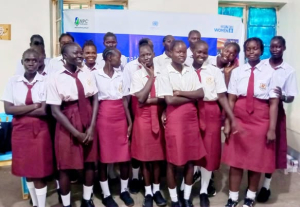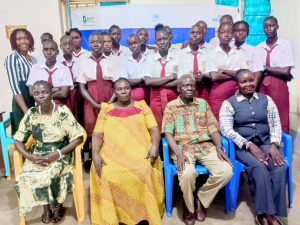NPC-SS establishes yet another Girls Leadership Club
Driven by a passionate commitment to nurturing transformative female leaders in South Sudan, the National Press Club – South Sudan (NPC-SS) has expanded its Girls’ Leadership Club initiative by establishing a new club at Juba Girls Secondary School, a government-owned institution. This marks a significant milestone being the first club formed in a public school, under the ongoing project “Women’s Leadership and Political Participation During South Sudan’s Transitional Period,” supported by the Peacebuilding Fund through UN Women South Sudan.
The launch event was met with great enthusiasm by the school administration, students, and partners. The presence of UN Women South Sudan added notable significance to the occasion. Representing the UN Women, Mrs. Betty Adong read the speech of the UN Women Country Representative and expressed heartfelt support for girls’ leadership. She emphasized that the club is “not just a school activity, but a movement that begins in the classroom and stretches to government institutions, the media, civil society, and beyond.” Betty added that the club provides a safe space where girls can be nurtured to become confident, courageous, and capable leaders who will challenge stereotypes, break societal barriers, and redefine what it means to be a woman in leadership. “UN Women is proud to support this initiative as part of our broader commitment to advancing women’s leadership and political participation in South Sudan,” she concluded.
Mr. Bullen Kenyi, Chairperson of NPC-SS, also addressed the gathering, emphasizing that leadership begins in the classroom. “Leadership begins in the classroom, and it is a skill that must be built in practice. That’s why NPC-SS is investing in secondary school girls. We are empowering you to grow up as confident and courageous leaders, able to challenge bullying, stereotypes, and exclusion,” he said.
The school’s patron, Mrs. Thereza Juan, expressed her appreciation to NPC-SS for bringing such a valuable initiative to Juba Girls Secondary School. She affirmed its importance in shaping the mindset and future of young women.
The club’s newly elected chairperson, Ms. Alisha Ijok, spoke with enthusiasm about her commitment to leading the club. “It’s the first time I’ve encountered such a unique initiative. I stood up to lead because I’m passionate about it. I am ready to serve and to face any challenges that may come,” she declared.
The Girls’ Leadership Club is a pioneering approach to building a generation of transformative young female leaders. As NPC-SS continues to empower young girls in schools, the movement toward inclusive, gender-sensitive leadership in South Sudan continues to gain momentum, starting from the classroom and reaching into every sphere of society.






















